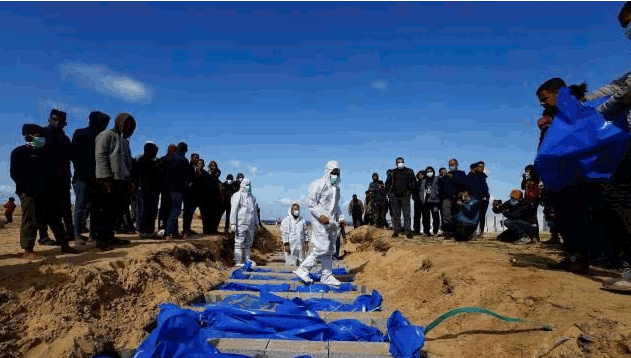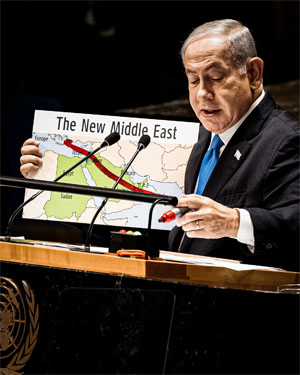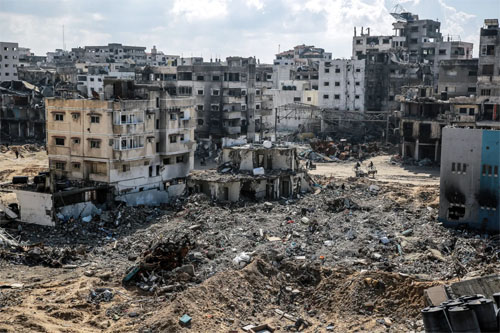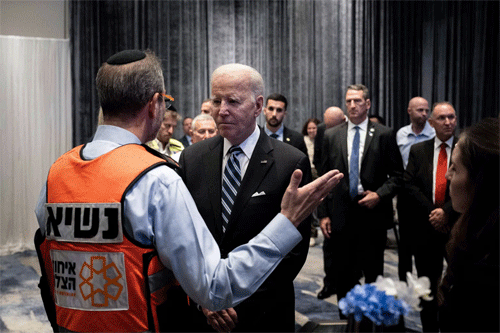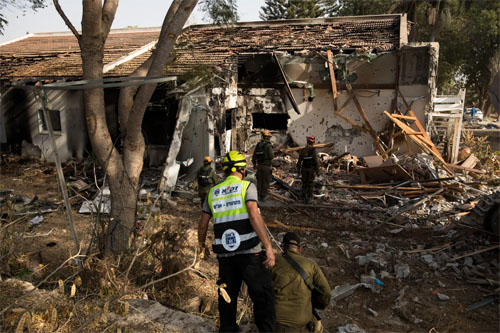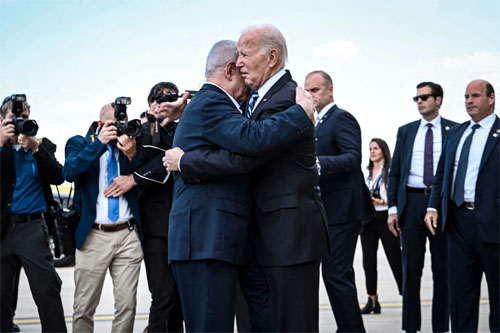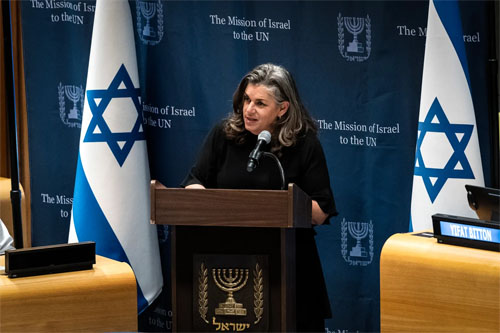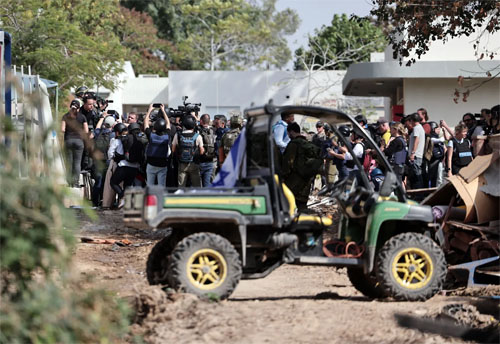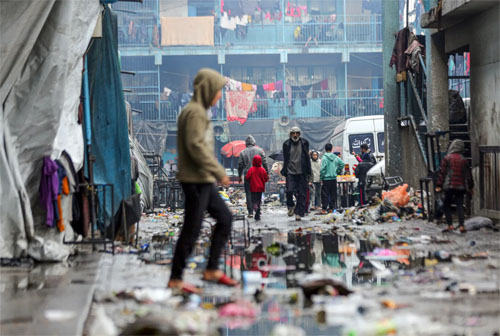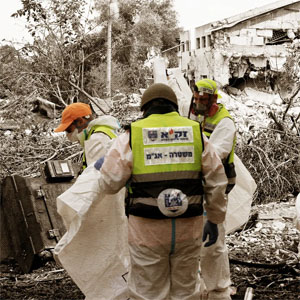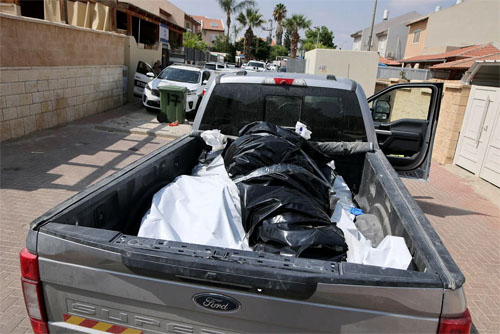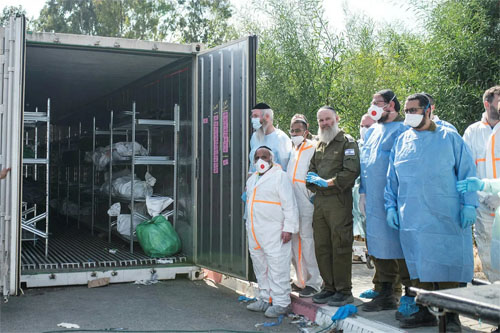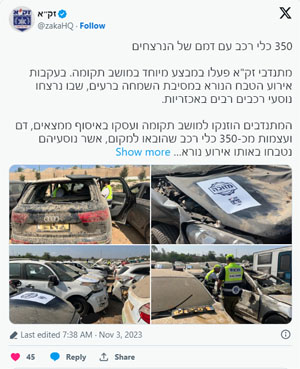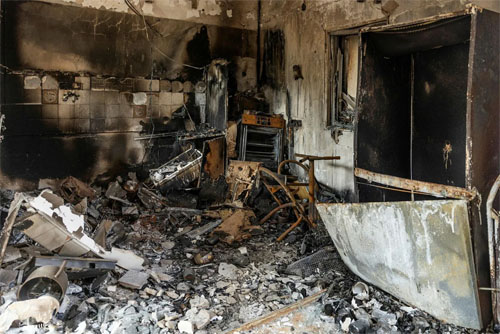Conscientious Objector/Israel Agents
by Ralph Nader
Ralph Nader Radio Hour
Episode 515
January 20th, 2024
Steve Skrovan: Welcome to the Ralph Nader Radio Hour. My name is Steve Skrovan along with my cohost David Feldman and the rest of the crew. Hello, David.
David Feldman: Morning.
Steve Skrovan: And the man of the hour, Ralph Nader. Hello, Ralph.
Ralph Nader: Hello. This program features a candid whistleblower from the State Department who resigned and a great investigative reporter on what's happening to our civil liberties because of the Israeli conflict.
Steve Skrovan: That's right, Ralph. As we record this program, it's been well over 100 days since the State of Israel started its relentless siege on Gaza (Strip) in response to the Hamas attacks on October 7th. This campaign has been enthusiastically supported by the Biden administration, which continues to provide Israeli Prime Minister Netanyahu's government with the means to carry out their genocide of the Palestinian people. As taxpayers, our money is funding all of this death and destruction, making us complicit.
Our first guest today is former State Department official, Josh Paul. Mr. Paul was a member of the Bureau of Political-Military Affairs, which he describes as the U.S. government entity most responsible for the transfer of arms to allies, including Israel. In protest, Mr. Paul tendered his resignation 10 days into the conflict. He explained that "This administration's response, and much of Congress as well, is an impulsive reaction built on confirmation bias, political convenience, intellectual bankruptcy, and bureaucratic inertia. That is to say, it is immensely disappointing and entirely unsurprising."
In the second half of the show, we're going to pivot to the second front of the war on Palestine, America's college campuses. We've previously covered Congress's dubious investigation into anti-Semitism on college campuses and the moral panic conflating anti-Zionism or any slight criticism of Israel with anti-Semitism. What if we told you that most of this fearmongering and accusations of anti-Semitism wasn't organic? Instead, it's actually the product of decades of illegal anti-Palestinian espionage, covert action, and blacklisting of Americans within the U.S. by the Israeli government and a network of domestic collaborators.
Investigative reporter James Bamford will be joining us to explain the "massive operation to spy on and crush pro-Palestinian students throughout the country, to establishing a secret Israeli-run troll farm across the U.S., to harass anyone critical of Israel, to hiring Americans to secretly spy on American students and report back to Israeli intelligence."
As always, somewhere along the line, we'll check in with our corporate crime reporter, Russell Mokhiber. But first, let's talk to a State Department insider who could no longer be part of sending arms to Israel. David?
David Feldman: Josh Paul served 11 years in the Bureau of Political-Military Affairs at the U.S. Department of State before his resignation on October 17th, 2023. Mr. Paul previously worked on security sector reform in both Iraq and the West Bank with additional roles in the Office of the Secretary of Defense, U.S. Army staff, and as a congressional staffer. Welcome to the Ralph Nader Radio Hour, Josh Paul.
Josh Paul: Thank you very much indeed. It's an honor for me to join you.
Ralph Nader: Thank you very much, Josh. You, so far, are the only quasi-high official of the State Department to resign in protest. What's your read about others resigning as a matter of conscience from the State Department? Is there a lot of upset and dissent that reflects your concern that this issue of the Israeli-Hamas conflict is not being fully and fairly debated in the State Department?
Josh Paul: Yes, I think there are a lot of people, and I've heard from very many of them, who are immensely frustrated, disappointed, and troubled by the stance that the Biden administration is taking, particularly within the State Department, where people, I think understand not only the moral failings of our current policy, but also the practical failings and the impact that our current approach is having on our relations across the world and our ability to rally America's allies and partners around the issues that we care about.
A lot of people are very deeply troubled and are taking actions within their roles to try and address this, including through the formalized dissent channel, where many people have expressed concerns and recommendations to Secretary of State Blinken on a change of course, and as well through more public channels. We've seen public letters. We've seen a vigil outside the White House of executive branch staff, and in the last 24 hours here as we speak, on Wednesday, (January 17) we saw a day of grieving, a day of mourning, in which many public civil servants took part, including not going to work as they mourned the losses of the last few months.
There is an immense amount of frustration and effort being made to change the course. Unfortunately, it does not seem to be registering yet with the Biden administration.
Ralph Nader: The State Department's original charter back in [Benjamin] Ben Franklin days was diplomacy and customs. Now it seems to be more a Secretary of War than a Secretary of State.
Josh Paul: Well, I think that's right. To be fair, and in the State Department's defense, and in a structural defense, it is interesting that the United States places control of arms transfers and security assistance within the State Department. That is a different model than most of our allies follow, in which those functions are in the Department of Defense or Ministry of Defense or Ministry of Trade. And there is an advantage to putting them in the State Department, so that they can be considered as tools of foreign policy, along with other diplomatic tools, such as economic assistance and diplomatic engagement.
So, there is an advantage there. But there is also, inherently by doing so, a militarization of foreign policy, particularly when we look at the massive amount of funding that is provided for military assistance, and of course, the way that providing that assistance then links us to the actions of our partners, whether we want to be complicit in those actions or not.
There is a bit to unpack there. But you're right. We have seen increasingly, and particularly since September 11th, a militarization of our foreign policy and an increasing reliance on tools such as arms transfers and security cooperation, to pursue diplomatic objectives. And that is a problem.
Ralph Nader: Before we get to that, let's talk about Congress. What do you make of this overwhelming defeat of Bernie Sanders's proposal regarding weapons aid to Israel? Just now, there were only 11 senators who voted with him, and his proposal on the floor of the Senate was turned down. What's your take on that?
Josh Paul: It's obviously very disappointing, but I don't think it's surprising. One of the things that stood out to me several months ago when I resigned, was that typically, when we are talking about human rights issues connected to arms transfers, Congress is an ally in terms of raising those concerns, in terms of speaking up, holding hearings, and pressing for delays while we figure out and understand what is happening.
That was not the case here. In this context, Congress was pushing as hard, if not harder, than the Biden administration itself, to rush arms to Israel to assail Gaza. There is a blind spot in our foreign policy, including when it comes to Congress's consideration of these issues and of the humanity of the Palestinian people. So it's not surprising.
A lot of people in Congress, first of all, are uneducated on this issue, frankly, or are educated just by one side, and second of all, who are paying very close attention to what their networks are telling them to do and how they're being told to vote, rather than to what their constituents are telling them to do. I've heard from many congressional staff who say they are getting calls in favor of a ceasefire at a 10 to 1 ratio from constituents. Yet, this is not translating into a member position, which is reason for concern in our democracy.
Ralph Nader: Jim Zogby, the head of the Arab American Institute, gave an address years ago to an Israeli university audience talking about the other anti-Semitism. By that, he meant that apart from anti-Semitism against Jews, there's a virulent anti-Semitism against Arabs backed by military power and destructive weaponry. What do you think of that?
You've served in the Arab world. You've been in Iraq and elsewhere in your career at the State Department. Why is anti-Semitism against Arabs viewed as permissible? Especially with the mass slaughter going on in Gaza at present against civilians, of which 70% of the dying are children and women.
Josh Paul: That's right. And it is very evident in current statements, including those coming out of this administration and President Biden. On the 100-day anniversary of the October 7th attacks, that were followed by thousands, as you say, of civilian casualties in Gaza, the president's message made no reference to Palestinians.
Whenever he or other officials talk at the White House about the events of and since October 7th, they humanize the Israeli suffering quite rightly and talk about individual stories and the suffering that has happened, but when it comes to the suffering in Gaza, which is numerically of a scope and scale so much larger, it is mentioned in an offhand manner—we require or we would like to see fewer civilian deaths—without any of that storytelling and humanization that accompanies talking about the Israelis.
A blind spot has been there, as we know, for many years when it comes to American foreign policy, dating back well before 9/11, dating back to the ‘90s, to the time of Madeleine Albright, where she was able to dismiss the death of half a million Iraqi children through starvation as a necessary part of U.S. policy. This is a very deep vein, I'm afraid, in our foreign policy, one that has ultimately harmed us as a nation, very much indeed, in the sense that in creating this blind spot, we have also lost a part of our souls and part of our values.
It is incumbent on us to turn back to the Arab-American community and to the Muslim-American community to find those values, because they are the ones who are currently expressing American values when it comes to ending civilian suffering in Gaza and calling for peace. You don't see that in mainstream America right now. By advancing the bigotries of our society, we have also lost a big part of ourselves.
Ralph Nader: Let's talk about the gross undercount of the fatalities in Gaza. They're still talking about 24,000 fatalities, and they cite the Hamas Health Ministry.
Look at the reality here. Imagine if Philadelphia, which has 1.5 million people and is about the size of Gaza geographically, was subjected under siege to no food, no water, no medicine, no electricity, no fuel, and no health care, as an official policy of the attacker, and over 33,000 bombs and missiles were dropped on defenseless people in Philadelphia. Would anybody think that 99% of the people in Philadelphia would have still survived after 100 days?
Hamas seems to have an interest in lowballing its own fatalities, because it doesn't want to be criticized more by Gazans for not protecting them at all. What's your view of this undercount? And what do you think is the real minimal estimated casualty toll in terms of dead and injured?
Josh Paul: It's not just you who is saying there's an undercount. It's the Biden administration as well. Assistant Secretary of State for Middle East Affairs in the State Department (Near Eastern Affairs – NEA, Congresswoman Barbara Lee actually testified to Congress in November that she believes that the count being put out by the Hamas-controlled Ministry of Health in Gaza is an undercount. The Biden administration agrees with you that we are not capturing as many deaths as are occurring.
I fear that we are just at the very beginning of this humanitarian crisis, that as many as have been killed by Israeli or rather by American bombs, frankly, in the last few months, there could be many times that number who will succumb to disease and starvation in the rest of this year. I don't know that the world is prepared for that. I certainly know that the humanitarian community is not being allowed to prepare for that in terms of their access to Gaza that would be needed to prevent this. We are at the start of a very dark period, unfortunately.
Ralph Nader: It might be added that 80% or more of Gazans have been displaced and they're living exposed to the elements or under tents, mostly in the southern part of this tiny enclave, which is only twice the size of the District of Columbia.
Let's go to the core of your expertise, Josh Paul. Over the years, there was an embargo on Gaza by Israel, which is considered illegal under international law. Given the Israeli surveillance technology of the Palestinians—considered by experts as the most advanced technological surveillance in the history of the world—how did Hamas get these weapons and the ammunition ready to use? Where did they come from? How did they get through?
Josh Paul: The best analysis coming out of the U.S. is that for the most part, these are weapons of Iranian origin and sometimes of North Korean origin and elsewhere from around the world. How they got through is a very good question, that speaks to the issue of Israel's siege on Gaza, which was intended to prevent this sort of flow of arms into the Gaza Strip.
What that tells you at the end of the day, is that what you need here is a political solution, because there is no military solution both to Hamas's capabilities and to the ingenuity of mankind in being able to build, smuggle, and construct, the arms that they have on hand. The bottom line of the answer here, is that there is no military solution. There is no military capability that can keep 2.3 million people cooped up with no ability to build an arms cache. We need a political solution.
Ralph Nader: Before a political solution, some people have spoken of a two-state solution, which Muslim countries have been proposing since 2002, in an open letter, and Israelis have been ignoring it. What do you make of Prime Minister Netanyahu's statements over time, including to his own Likud party in 2019, that the Israeli government is supporting and facilitating the funding of Hamas because Hamas doesn't believe in a two-state solution and can stop the Palestinian Authority from moving in that direction? This is an astounding position given Netanyahu's recent denunciation of Hamas. It seems like he enabled Hamas over the years. What's your reaction?
Josh Paul: That's exactly right. He has, and I think Israel has often played Hamas off against the Palestinian Authority (PA), while at the same time undermining the PA in every way it can, by withholding salaries and using the PA to pursue Israeli security objectives rather than Palestinian security objectives. That's a game that we, the United States, have played our part in.
There has been, in parallel with the expansion of settlements, with the continuation of the siege of Gaza, an effort to essentially deconstruct and divide, the State of Palestine, before one can even be established, to make it impossible to establish. That has been very much at the core of Prime Minister Netanyahu's policy, and it has blown back on him in some respects. And yet, it is hard to see how we go forward from here politically.
Ralph Nader: Let's talk about humanitarian aid. We've been listening to Joe Biden saying he wants more humanitarian aid, and it's already funded by the U.S., and there are hundreds of trucks ready to come in with food, medicine, shelter, and other necessities of life. But the Israelis are only letting in anywhere from 50 to 100 trucks. Those trucks can't get to their destination because of the bombing and the broken-up roads, and most of the hospitals are not around operating to receive this aid.
Is Biden talking with a forked tongue here? He's shipping all kinds of arms unconditionally, as you know better than most, to the Israelis. Can he turn the screws on them and say, "I want 600/ 700 trucks a day going into Gaza," which was the case before October 7th, "because people are dying, being injured, sick, babies dying without this humanitarian aid hour by hour." What would you say to the president that he must do right now? Every day, hundreds are dying.
Josh Paul: Biden could be doing a lot more, and he's choosing not to. His policy and America's policy continues to prioritize Netanyahu's explicit policy, which is "the destruction of Hamas" over and against the humanitarian needs of the Palestinian people.
It took three months of negotiations with Israel to get them to open the Kerem Shalom crossing into the south of Gaza from Israel. There is still the Erez Crossing in the north of Gaza, where thousands of Palestinians still remain stranded, trying to survive, and opening the Erez Crossing, which Israel has not opened, is another option.
There are also options. For example, I think there is a significant concern that the only option for Palestinian people in Gaza to get humanitarian assistance might be to leave Gaza. If that is the case, of course, not only are we essentially talking about another Nakba, but that doesn't have to be the case if they were able to proceed into, for example, the Negev, but that is not something that people are even talking about. But that would keep people on the land.
There are any number of options that President Biden could be pursuing, but the proof that he is not is that he is not using any of the leverage that he has with the government of Israel to pursue those options. He is not making military assistance conditional upon the provision of humanitarian support. He is not making military assistance balanced against, for example, action in the United Nations (UN) to call for a ceasefire, or to at least get out of the way of those in the U.N. who are calling for a ceasefire. He is simply asking nicely and then saying that he is all out of options.
There is a lot more the United States and President Biden could be doing here. My concern is that he just doesn't seem particularly to want to.
Ralph Nader: You think it's the election?
Josh Paul: It's a number of factors. One of them may be the election, but if you look at the electoral math for President Biden, particularly as he hits record-low numbers in polling, I don't see the logic there. He is losing a lot of support rather than gaining it through this approach.
Many people in this country will not turn out to vote for him as a result of the steps that he has taken in the last few months. Yet rather than turning around and trying to appeal to those people, he is doubling down, while those who are very strongly on the side of Israel, whether it be the Christian evangelical community, or the American religious Zionist community, will go and vote for the Republican. So, I don't know what President Biden is getting electorally or politically out of this. For him, it’s a deeply held position. He is frozen in his 1970s perspective where they were formed. But the reality on the ground is very different now than it was then. The politics of Israel, for that matter, is very different now than then. There is an unwillingness on his part to budge due to a personally held belief, which is unfortunate.
Ralph Nader: Let's look at the extraordinary abdication of Congress under its constitutional duties. Congress should be having oversight hearings now. There are no oversight hearings about the position of the White House vis-a-vis the Israeli war in Gaza, neither in the House, under the Republicans, nor in the Senate. There's no unofficial hearing by Democrats in the Progressive Caucus who would like to see a hearing.
There's never been a hearing since 1948 in the U.S. Congress featuring Israeli peace advocates, many of them former generals, mayors, ministers of justice, and former heads of security agencies. There was a documentary on the latter a few years ago, where the retired people from Shin Bet and Mossad were criticizing the Netanyahu regime vis-a-vis the Palestinian issue.
What's your take on Congress here? It's been said that in the last three months, the pro-Palestinian people in the United States have controlled the streets, but the pro-Netanyahu people in the United States have controlled the suites in Congress and the executive branch.
Josh Paul: You’re right. There are a lot of credible voices on the Israeli side, calling out the Netanyahu government for its current approach. Unfortunately, if you look at the polling, they are also in a significant minority right now in Israel, but they are nevertheless important voices.
Congress has a key role to play here that it is abdicating, not only in terms of hearings, not only in terms of, for example, the resolution that Senator Sanders brought to the floor yesterday, not only in terms of speaking out more publicly, calling for a ceasefire. It's interesting. I have spoken with many members of Congress in the last few months, and even for those who haven't publicly called for a ceasefire, many are willing to acknowledge behind closed doors that they believe that Israel is committing war crimes, but they will not say it publicly.
To me that’s such a moral abdication of the purposes for which they were elected. If you know something to be a fact, if you know the U.S. to be complicit in facilitating war crimes, but are unwilling to say it because you are afraid of how your donors might react or how your next election might go, why are you even in Congress? So, there is a significant gap there. It is an important note because it is not just Congress where this debate is being silenced or where people are being censored or are self-censoring. We're seeing it in the American public, too. I've heard from many doctors, lawyers, and engineers who say, "I would like to stand with you, but if I am too vocal, I will lose my job."
The result of all this, when you do not have free debate in society, when you do not have free debate in Congress, when you do not have free debate in government, is that you get bad policies.
We know that's how autocracies fail, because they do not have free debate and they get bad policies as a result.
That's happening here specifically in the context of Israel and Palestine. But it also makes me afraid for the future of our democracy more broadly, because if there is one issue where you cannot speak up on, if there is one issue where you are shouted down and condemned for voicing an opinion on the side of humanitarian issues, there will be other issues, I guarantee you, where the same becomes true.
Ralph Nader: We're going to have, after our interview, James Bamford, who's written a book and two articles in The Nation on the organized pressure to suppress dissent on campuses and to call out the students who are supporting the ceasefire and the Palestinian two-state cause by name, by picture, trying to get them to have their job offers rescinded, extremely well organized. And James Bamford, of course, is famous for writing the first book of any kind on the National Security Agency (NSA). He has a sterling record of accuracy.
Would you come out publicly for congressional hearings of prominent Israeli and Palestinian peace advocates who have been at it over the years, but have been blocked from any voice in the U.S. Congress by the American Israel Public Affairs Committee (AIPAC) and other similar lobbies? Don't you think that's the beginning of providing voices of dissent from Israel before the U.S. Congress?
Josh Paul: Of course. And if the administration, if President Biden is sincere in wanting to do more to press Israel to reduce civilian casualties, the administration should support that as should Congress. Because that is one of those tools that does not involve cutting off military assistance and does not involve backing Israel at the UN. It simply involves demonstrations of concern from Congress and therefore gives some amount of added pressure without actually changing anything.
So for those in the administration and in Congress who believe that we should be doing more to support, and to be concerned about Palestinian lives, about humanitarian suffering, and yet are not willing to take any solid steps, there is no reason whatsoever that they should not support that sort of hearing.
Ralph Nader: As you say, the calls are pouring into the switchboard in Congress at 10 to 1, demanding a ceasefire, and that President Biden stand up for America's prime interest here, which you have described in your interviews since you left the State Department.
But I'm curious about one thing that you have expertise on. Why is the Biden administration sending 2,000-pound bombs to Israel when it hardly used the 2,000-pound bombs in the war in Iraq? For those who don't know about this, 2,000-pound bombs have extraordinarily increased devastation on civilians. Can you enlighten us on this?
Josh Paul: Yes. We also know from public reporting, including from CNN, Wall Street Journal, New York Times, and others, that Israel is using many of these 2,000-pound bombs in an unguided capacity. So rather than, for example, attaching a precision guidance kit to these, it is simply dropping them on Gaza.
As to why the Biden administration is providing these to Israel, the answer is very simple. Israel is asking for them and no one has the guts to question that. No one has the guts to say no. This is very much part of the dynamic that I saw before leaving government—that Israel was coming in and making these extensive, expansive requests for weapons, many of which were not applicable in the context of Gaza, and yet no one was willing to say, "Let’s talk about this. This doesn't make sense. How are you going to use this?"
“When a 2,000-pound bomb hits the ground, the earth turns to liquid,” Marc Garlasco, a military expert, told The Washington Post. “It’s like an earthquake.”
-- Israel’s War on American Student Activists: For years the Israel on Campus Coalition—a little-known organization with links to Israeli intelligence—has used student informants to spy on pro-Palestinian campus groups, by James Bamford
Ralph Nader: Do Israelis pay for these weapons, or is that part of the $4 billion that comes every year from the U.S. to Israel?
Josh Paul: That is yet to be determined for many of the current arms transfers. We do provide Israel, as you say, just under $4 billion a year in ground military assistance. That's about 20% of the Israeli defense budget. They spend their own money as well, procuring arms from the U.S., and of course, President Biden's supplemental request would provide them with several billion dollars more in military grant assistance. So if that were to not pass, I suspect that Israel would have to spend its own money on these. But in the meantime, we can assume that a lot of this is courtesy of the U.S. taxpayer.
Ralph Nader: Have you spoken out against this $14.3 billion request from Biden to the Congress to send aid to Israel, tied up in a bill for military aid to Ukraine and Taiwan? Have you spoken out publicly against this? It's been called the genocide tax that outraged so many people to further kill more innocents.
Josh Paul: Yes, and I have some specific concerns beyond the simple provision of further funding, which I think we should all question. These provisions/new authorities in the president's request would expand the scope and the speed of arms transfers while reducing congressional oversight.
As little as Congress has done on this issue set, we should be concerned about that as Americans. Congress is our overseer of the executive branch, and reductions in that transparency, particularly while expanding and expediting the capability to provide arms into this context and into this conflict, is problematic and should be so, from a perspective of concern about American democracy.
Ralph Nader: What's interesting is there aren't even any public hearings on this scheduled. Congress has aborted its public hearing function. And it's given over the years, the power to declare war, to the presidency under very vague standards. However, Congress has that exclusive power - as James Madison pointed out in the Constitution - to declare war. There are all kinds of violations of law here. It seems like the U.S. empire and the micro-empire of Israel don't feel like they have to adhere to any international laws—the Geneva Conventions nor the Genocide Convention. What's your view of the State Department not ever raising these issues, not saying to the White House, "I think you should go to Congress on this, given our interpretation by the legal advisor of the U.S. Constitution."
JUDGE JOAN DONOGHUE: In the court’s view, the aforementioned facts and circumstances are sufficient to conclude that at least some of the rights claimed by South Africa and for which it is seeking protection are plausible. This is the case with respect to the right of Palestinians in Gaza to be protected from acts of genocide and related prohibited acts identified in Article III and the right of South Africa to seek Israel’s compliance with the latter’s obligations under the convention....
The court considers that there is urgency in the sense that there is a real and imminent risk that irreparable prejudice will be caused to the rights found by the court to be plausible before it gives its final decision. The court concludes, on the basis of the aforementioned considerations, that the conditions required by its statute for it to indicate provisional measures are met. It is therefore necessary, pending its final decision, for the court to indicate certain measures in order to protect the rights claimed by South Africa that the court has found to be plausible....
By 15 votes to 2, the state of Israel shall, in accordance with its obligations under the Convention on the Prevention and Punishment of the Crime of Genocide, in relation to the Palestinians in Gaza, take all measures within its power to prevent the commission of all acts within the scope of Article II of the convention — in particular, A, killing members of the group; B, causing serious bodily or mental harm to members of the group; C, deliberately inflicting on the group conditions of life calculated to bring about its physical destruction, in whole or in part; and, D, imposing measures intended to prevent births within the group....
During the ongoing conflict, senior United Nations officials have repeatedly called attention to the risk of further deterioration of conditions in the Gaza Strip. The court takes note, for instance, of the letter dated 6 December, 2023, whereby the secretary-general of the United Nations brought the following information to the attention of the Security Council.
I quote: “The healthcare system in Gaza is collapsing. Nowhere is safe in Gaza. Amid constant bombarding by the Israel Defense Forces and without shelter or the essentials to survive, I expect public order to break — to completely break down soon due to the desperate conditions rendering even limited humanitarian assistance impossible. An even worse situation could unfold, including epidemic diseases and increased pressure for mass displacement into neighboring countries. We are facing a severe risk of collapse of the humanitarian system. The situation is fast deteriorating into a catastrophe, with potentially irreversible implications for Palestinians as a whole and for peace and security in the region. Such an outcome must be avoided at all costs,” end of quote.
On 5 January, 2024, the secretary-general wrote again to the Security Council, providing an update on the situation in the Gaza Strip and observing that — I quote — “Sadly, devastating levels of death and destruction continue,” end of quote.
The court also takes note of the 17 January, 2024, statement issued by the UNRWA commissioner-general upon return from his fourth visit to the Gaza Strip since the beginning of the current conflict in Gaza. I quote: “Every time I visit Gaza, I witness how people have sunk further into despair, with the struggle for survival consuming every hour,” end of quote.
The court considers that the civilian population in the Gaza Strip remains extremely vulnerable. It recalls that the military operation conducted by Israel after 7 October, 2023, has resulted inter alia in tens of thousands of deaths and injuries and the destruction of homes, schools, medical facilities and other vital infrastructure, as well as displacement on a massive scale. The court notes that the operation is ongoing and that the prime minister of Israel announced on 18 January, 2024, that the war — I quote — “will take many more long months,” end of quote.
At present, many Palestinians in the Gaza Strip have no access to the most basic foodstuffs, potable water, electricity, essential medicines or heating. The World Health Organization has estimated that 15% of the women giving birth in Gaza Strip are likely to experience complications, and indicates that maternal and newborn death rates are expected to increase due to the lack of access to medical care.
In these circumstances, the court considers that the catastrophic humanitarian situation in the Gaza Strip is at serious risk of deteriorating further before the court renders its final judgment. The court recalls Israel’s statement that it has taken certain steps to address and alleviate the conditions faced by the population in the Gaza Strip. The court further notes that the attorney general of Israel recently stated that a call for intentional harm to civilians may amount to a criminal offense, including that of incitement, and that several such cases are being examined by Israeli law enforcement authorities. While such steps are to be encouraged, they are insufficient to remove the risk that irreparable prejudice will be caused before the court issues its final decision in the case.
-- International Court of Justice Orders Israel to Prevent Genocide in Gaza But Fails to Order Ceasefire, by Amy Goodman, DemocracyNow!, January 26, 2024
Josh Paul: Let me first say that I have an immense amount of respect for the State Department lawyers. They are hardworking, thoughtful, insightful people. The problem is that for any legal team within government, any legal institution within government, within the executive branch, their job often becomes to interpret the law as broadly as possible in favor of the presidency. In many of these cases, what we have is a problem of how the executive branch interprets the law so that it does not bind the hands of the president. And that leads to all sorts of difficult consequences when it comes to, for example, the application of human rights vetting that is in law under the Leahy Laws for Israel or for other countries for that matter, when it comes to determining whether a country is engaged in a continuous practice of gross human rights abuses.
So, these are all sorts of questions of interpretation, where the problem is that the lawyers in the department and across government tend to say, what is the narrowest interpretation that will give the president the broadest scope? And the problem here is that you then create a massive accountability gap that you have an absence of ability to bind the executive to both the American laws or for that matter, to international law, which of course is much less binding and much more consensus based, which is then further advanced when you have courts that defer deeply to the executive on a lot of these issues, such as questions of foreign policy, questions of defense policy.
So, there are really very few hooks in the current structure that provide a means of accountability, a means of holding people to account, a means of questioning decisions. This is in Congress's hands to fix. Congress has the ability to write stronger laws, to write laws that have actual hooks, that have actual triggers that bring them into effect. So I would throw that back into Congress's court, but for now, that's where we are.
Ralph Nader: Do you see a wider war occurring? The papers are full of projections that this war is widening. It may involve neighboring countries. It may involve Iran. Biden keeps saying that he's working vigorously to make sure that doesn't happen, but the U.S. has bombed in Syria recently, Iraq, and the Red Sea. And what's your view here? Is it going to get out of control?
Josh Paul: Look, I hope not, but the longer the conflict in Gaza continues, the greater the risks of that sort of escalation becomes. That is another reason why it should be in the U.S. interest to press Israel to end its bombardment of Gaza, to end its invasion of Gaza, as quickly as possible, because the longer this lasts, the more the risks increase.
Ralph Nader: Let's go to Steve and David and Hannah. They want to ask you a couple of questions or make a comment. Steve?
Steve Skrovan: Josh, the stated goal of the Netanyahu government is to eliminate Hamas. Is that even possible? It's not like they're wearing uniforms. It's a small fundamentalist philosophy. It's an idea. Is that just PR that they can eliminate Hamas?
Josh Paul: So, I don't know what the thinking was at the start of this operation on the part of the government of Israel, but it is not a feasible goal. They might be able to significantly, and for a significant amount of time, degrade the military capabilities of Hamas. I'm sure they've already done that. But you cannot go to war against a political movement, and you cannot go to war against an ideology. This is a political problem that requires a political solution.
This creates some significant challenges when you start wondering about what comes in the post-conflict space. If we are talking about Palestinian self-determination, there is inevitably going to be some support for Hamas, given particularly the events of the last three months and how Hamas looks compared to the fecklessness, frankly, of the Palestinian Authority. I don't know how you go forward from here, from this situation that has been created with neither a military solution nor a political solution that is workable for people. But the short answer to your question is "no."
What I fear will happen is that there will not be a ceasefire, that Israel will keep this an open-ended conflict, and feel free to strike at whoever it says is Hamas or Hamas linked. Israel has painted a very broad swath, including through the comments of its president who has said that it is a whole nation that is at fault here or that is involved here. But even assuming that that is not the case, we will still see Israel feeling that it has a free hand to bomb, to strike Gaza, Palestinians in the West Bank, which we've seen increasingly in the last few weeks--for years to come. That is a recipe for a continued humanitarian and political disaster.
Ralph Nader: David?
David Feldman: What would happen if we had a real isolationist government here in the United States that said, "No more foreign aid for Israel, no cooperation on Iron Dome, we're just protecting our own interests," to basically neglect, abandon Israel?
Josh Paul: First of all, I'm not personally advocating for an isolationist approach writ large by the U.S. I think we do have an important role to play in the world. I wish we played it better and with more humanity. But when it comes to Israel's ability to stand alone, I think it would succeed. It has.
Let's talk about the defense sector. We provide Israel with $3.3 billion a year in foreign military financing. Israel is allowed to use a significant portion of that on its own defense industrial base. Over the years, over the tens of billions of dollars, what that means is that Israel is now a top exporter of weapons.
Israel has a strong defense industrial base. Israel has the means to support the military operations it wants to do, if it is willing to pay the cost in terms of raising taxes, and if it is willing to take those sorts of approaches. Israel also has burgeoning partnerships with many countries in the region, including through the Trump administration's Abraham Accords, which connected it with the United Arab Emirates, with Morocco, and with others.
Israel is not entirely dependent on the United States in the way that it would have been 20 or 30 years ago. That said, a complete cutoff now, or significant conditioning of our arms, would force Israel to make some much tougher decisions about where its actual defense requirements lie and where it wants to use the weaponry that it has.
Ralph Nader: Hannah?
Hannah Feldman: You've served under different presidents. Why now? What about this situation just snapped it for you?
Josh Paul: I think it was two main factors, one of which was the scale and the scope of the Israeli operations in Gaza, which we have seen in just over three months now more destruction of houses than the firebombing of Dresden, have killed more journalists than in any conflict since World War II, have killed more children in three months than have died in Ukraine in two years. And this is all being done with our bombs, with our money, with our weaponry, with our support.
So that was the first factor, the sense that we were a part of this absolute horror that is unfolding on the ground. And the second, is this lack of debate. I've been involved in many morally perilous, you might even say morally torturous decisions in the State Department, in the security assistance, in the arms transfer business with many countries that the United States has relationships with that are autocracies or that are human rights abusers.
In all of those previous situations, I and others in the Department had been able to raise concerns, and had those concerns addressed in some way or form in a way that made me feel that I was doing more good by being there than what I would be able to do if I was not there. The difference here, in addition to the scale of what is happening, was that there was no space whatsoever for that raising of concerns—for those questions of how to mitigate some of these outcomes, or how to stop some of these or reduce some of these civilian casualties—there was simply this rush to arms.
Given that lack of space, many people who I'm talking to now in government who are thinking about resigning raise the question of, well, if they’re not there, who will be doing their job? Will it be someone who is going to care about the issues I care about, or will it be someone who is just going to rush forward on whatever they're told to do? In my situation, it didn't make any difference who was going to be doing the job because this was the policy and there was no space to address, debate, or raise concerns about it.
Ralph Nader: We've come to the end of our interview. Is there anything you want to say that we haven't asked you about? And has the media treated you well and given you a voice?
Josh Paul: I have been fortunate in that respect, at a time when there is a lot of censorship around this issue, to have been given a voice by the media. Part of the reason for that is what I look like., i.e., I am a middle-aged white guy who is therefore able to say things and to speak about the truth that many people who do not look like me would be shouted down for.
I want to say to many of your listeners that if you are in a situation like mine where you have privilege, it is very important to use that privilege for good. That is what enables others to speak up and creates the space in which policy change can actually happen by building that sort of critical mass and momentum. But it needs to be enabled to some extent by those of us who are in a position to do so.
Ralph Nader: Any recommendations to our listeners as to what they should do as citizens right now?
Josh Paul: Keep speaking up. And that involves both speaking to members of Congress, as well as members of local government. There have been a number of efforts. For example, Ferguson, Missouri recently passed in its council a ceasefire resolution, one of few city councils around the country that has done so. And that matters.
And of course, there’s building things with local communities, speaking to local media, writing letters to the newspaper, and ultimately organizing on a broader scale. That's something many of us are looking at and trying to figure out: how to harness this energy and to move things forward in the longer term.
Ralph Nader: Well, thank you very much for the time you've given us and the insights and the profile of courage that you've exhibited by resigning in protest as a matter of conscience, Josh Paul. And we wish you good luck and the best in terms of communicating more and more why you left the State Department in this turbulent time of massive destruction in Gaza.
Josh Paul: Thank you very much for having me. I really appreciate it.

